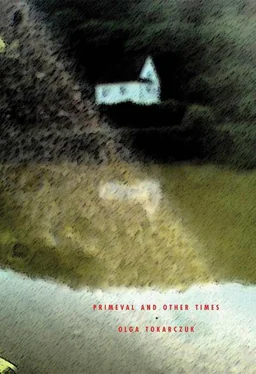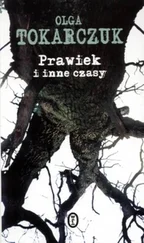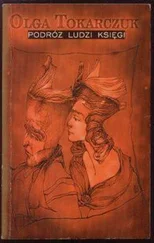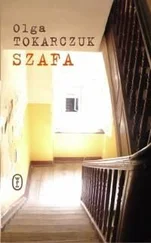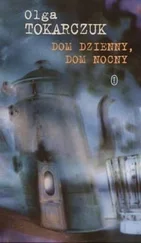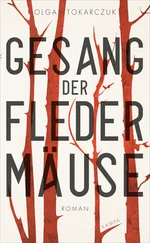Dolly thrives on images of the world. She takes part in the images that people create with their minds. When Misia says “Let’s go” and sees Dolly wagging her tail, she thinks Dolly can understand words like a person. But Dolly is wagging her tail not at the word, not at the concept, but at the image that has sprouted from Misia’s mind. This image contains the anticipation of movement, and of landscapes that keep changing, grass swaying, the Wola Road leading to the forest, grasshoppers chirruping, and the rushing of the river. As she lies there staring at Misia, Dolly sees the images that a human unwittingly produces. They can be images full of sorrow or anger. Those images are even more distinct, because they pulsate with passion. Then Dolly is defenceless, because she has nothing in her to protect her from getting lost in those alien, gloomy worlds, there are no magic protective rings of identity, there is no “self” supplied with powerful energy. So she is subdued by them. That is why dogs regard man as their master. And why the lowliest man can feel like a hero in his dog’s eyes.
The ability to experience emotion does not distinguish Dolly from Misia in any way.
An animal’s emotion is even purer, not clouded by any thoughts.
Dolly knows that God exists. She perceives Him all the time, and not, like people, just in rare moments. Dolly can smell His odour in the grass, because she is not separated from God by time. That is why Dolly has more trust in the world than any man could ever have. The Lord Jesus had similar trust inside him as he hung upon the cross.
THE TIME OF POPIELSKI’S GRANDCHILDREN
Straight after the end of the school year, Squire Popielski’s daughter, the one who used to walk about the park with a large dog, brought her children and her brother’s children to Primeval. Misia fixed up three rooms for them upstairs, and if there was a need, a room downstairs, too. And so at the end of June Paweł Boski’s dream guesthouse began to operate at full steam.
Squire Popielski’s grandchildren were robust and noisy. They showed no resemblance to their grandfather. And, as always happens in good families, they were all boys, except for one single girl. They were cared for by a nanny, the same one every year. The nanny’s name was Zuzanna.
The kids spent whole days by the Black River at a place called the Sluice, where young people came from all over the neighbourhood to bathe. Squire Popielski had once put flood-gates on the river to regulate the flow of water into his ponds. Now the ponds no longer existed, but skilful manipulation of the flood-gates made it possible to create a lake in summer and a metre-high waterfall. Grandfather Popielski cannot have imagined he would be giving his grandchildren so much joy.
The kids came home for lunch, which Misia often served in the garden under the apple trees. After lunch they went back to the river. In the evenings, Zuzanna organised games for them, either cards or “Categories” or anything else, as long as they were quiet. Sometimes Witek, who was not much older than them, made a bonfire for them behind the Hill.
Every year on Midsummer’s Eve Squire Popielski’s grandchildren headed off to the forest to look for the fern flower that was supposed to bloom that night. This expedition became a ritual, and one year Zuzanna let them go on their own. The squire’s grandchildren took advantage of the opportunity, and so no one would know, they bought a bottle of cheap wine in Jeszkotle. They took sandwiches with them, bottles of orangeade, sweets, and flashlights. They sat on the bench outside the house and waited until it finally got dark. They laughed and were noisy, pleased about their hidden bottle.
Squire Popielski’s grandchildren became quiet only in the forest, not because their mood had soured, but because in the darkness the forest seemed vast and scary. Their bold plan was to go to Wodenica, but the darkness put an end to that idea. Wodenica was a haunted place. They would go into an alder grove, where the most ferns grew. They would drink up the wine and smoke a forbidden cigarette, like the boys from Primeval.
The children walked towards the river in a line, holding each other by the shoulder.
It was so dark that the hands they stretched out ahead of them loomed in the blackness like barely recognisable smudges. Only the sky seemed clearer than the world enveloped in darkness – like a grand celestial colander with stars for holes.
The forest was behaving like an animal that keeps people away – it shook dew onto them, sent out a tawny owl, and told a hare to leap up suddenly under their feet.
The children went into the alder grove and groped in the dark, making themselves a picnic. The burning tips of the cigarettes glowed. The wine, which they drank straight from the bottle for the first time in their lives, gave them courage. Then they ran about in the ferns, until one of them found something shining among them. The alarmed forest began to whisper. The finder summoned the others. He was excited.
“I think I’ve got it, I think I’ve got it,” he kept saying.
Among the tangled blackberry bushes, something silver was glittering in the dampness of the fern leaves. The children parted the large leaves with sticks, and by the light of their flashlights they saw a shining empty tin. The disappointed finder picked it up on the end of his stick and tossed it away into the bushes.
The squire’s grandchildren sat down for a while longer to finish up the wine, and then went back to the road.
Only then did the empty tin blossom, casting an eerie, silvery brilliance all around it.
Cornspike saw it, who always gathered herbs on the night of the solstice, but was now too old to have any wishes, and she knew how much trouble you could bring on yourself with the fern flower. So she skirted round it at a distance.
THE TIME OF SQUIRE POPIELSKI
“Won’t you take a cup of tea with me, Misia, once you’ve finished?” asked the Popielskis’ daughter, who still had a young girl’s figure.
Misia stood up straight over the bowls full of dirty dishes and wiped her hands on her apron.
“Not tea, but I’d love a coffee.”
They took a tray outside and sat on either side of the table under the apple tree. Lila and Maja finished washing the dishes.
“It must be hard for you, Misia, to serve so many dinners and wash so many dishes… We’re very grateful to you for all this effort. If it weren’t for you, we’d have nowhere to come to. After all, this is our family neighbourhood.”
Miss Popielska, who once upon a time, long, long ago, used to run about the meadows with her big dogs, sighed sadly.
“And if it weren’t for you, we’d never manage to survive on Paweł’s wages. Letting out rooms is my contribution to keeping the family.”
“You shouldn’t think like that, Misia. After all, a woman works in the home, she bears children, she does the housekeeping, you know best of all…”
“But she doesn’t earn a living, she doesn’t bring home money.”
Some wasps flew down to the table and started daintily licking up some chocolate sauce from the gingerbread. They didn’t bother Misia, but Miss Popielska was afraid of them.
“When I was little, a wasp stung me on the eyelid. I was alone with my father at the time, my mother had gone to Kraków… it may have been 1935, or 1936. My father panicked and ran about the house yelling at me, and then took me somewhere in the car. I can hardly remember, to some Jews in town…”
Miss Popielska leaned her chin on her hand, and her gaze wandered somewhere among the apple and lime leaves.
“Squire Popielski… he was a distinguished man,” said Misia.
Miss Popielska’s hazel eyes glazed over and looked like drops of honeydew. Misia guessed that her private, inner time stream, the kind each person carries inside them, had turned back, and in the empty space between the leaves she was now seeing images of the past.
Читать дальше
